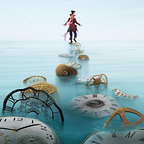The Price of a Distance
In recent times I have been brought to closer contact with a certain branch of film criticism as part of my studies. Many authors in the field appear to value objectivity in their study of film as an art, without a doubt firm in their belief that in doing so they are brought closer to the Modern ideal seemingly initiated by Immanuel Kant during the Enlightenment.
One of the favored tools of the trade for film critics is given the name of ‘Analysis’, which consists in the close dissection and examination of several elements contained in the picture: glances, shots, camera movements, music motives…, and how they all serve the narration.
Analysis is, evidently, a procedure borrowed from science, and I personally find it occasionally helpful, but often detrimental, to the critical exercise. Because it can lead to a kind of reductionistic reflection about film and its meaningfulness.
Ultimately, film, as art, is an emotional experience, which aspires to personality. In other words, the magic of art often relies on the way it pulls at our spirit, our personal history, our hopes and our dreams.
A filmmaker, essentially, writes in time, and he writes not in numbers, but in words, and he writes of people, about himself, first and foremost. He writes his dreams.
A possible misuse or over-reliance on analysic in criticism can avoid the critic emotional contact with the film’s characters and story (because every film, even the most abstract or futuristic, has characters and a story).
All art, even absolute music (some may say specially absolute music) is a story with characters whose experience is, in our view, ideal: which means, a singular individual experience which channels timeless ideas common to all kinds of people in all kinds of times and places.
The artist himself, at best, embodies the Ideal. For example, none should expect every man on Earth to be like Ludwig van Beethoven: some of us never will have hearing impairments in the first place. But we can all see ourselves in him, his pain, joy and struggles, we can all see him as our brother. And we all celebrate the beauty in his music as we celebrate the heroics mankind in her history has every so often proven herself worthy of accomplishing. Beethoven’s Ninth Symphony is the story of man made free by love of his brothers and sisters, and their union in the feast of Beauty. The story of Schiller’s ‘Ode to Joy’ is the essential story of every piece of art ever made: Beauty as the fulfillment of man’s destiny.
“Books are well written, or badly written. That is all.”
Oscar Wilde, The Picture of Dorian Gray
If there ever has to be a material analysis of an artwork, there has to be a willing effort on behalf of the critic of transcending the urge to reduce his criticism to an examination of language (as in, exactly how well written is our story?). Just as a literary critic would rarely consider the idea of limiting himself to evaluating the grammatical correction of a text, neither should a film critic restrict himself to evaluating the narrative language of film if it means neglecting the transcendence of its characters and their story.
This was by no means an effort to elaborate a method or a theory on how to review film as art rather than scientifical fact, but rather an exercise on my part to materialize a couple of my own ideas developed over the past months in the context of my experience in classes devoted to film criticism and theory. It was definitely not an attack on film criticism as an institution (nor as an art), but rather a personal reflection on some of the ideas which are implied in the exercise of many film critics, in hopes that it may prove fruitful to my readers and encourage them to think critically but personally, and concern themselves with the most delightful thing about film: the characters, who, being the closest thing to people we can find in the realm of art, they must also be the most important part of it.
Valencia
May 2021
